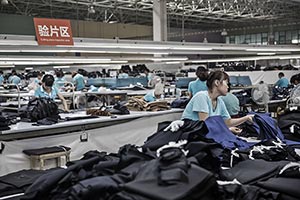China Would Outlast US in Trade War, Billion-Dollar Fund Says

China would outlast the United States in a trade war, which is a “distinct possibility” in 2017 after President-elect Donald Trump takes office, a commentator wrote in the $1 billion Pine River China Fund’s investor letter.
China’s government would be better placed than the United States to marshal state resources to cushion the effects on exporters, wrote James Wang, a City University of Hong Kong professor who pens a monthly commentary for the fund. Privately owned Chinese exporters would be worse hit than state-controlled peers because they have less political clout in Beijing, he said.
RELATED: FedEx Chief Fred Smith blasts Trump's trade policies
“By design, decision-makers in a democracy face difficulties coordinating a relief effort and must eventually face a political backlash from impacted domestic producers,” Wang wrote. “On this basis, the Chinese may have more runway to play the long game in a trade war.”
During his campaign, Trump pledged to brand China a currency manipulator and impose a 45% tariff on Chinese imports. His protocol-breaking phone call with Taiwan President Tsai Ing-wen and his attacks on China on Twitter have sparked further friction between the world’s two biggest economies before he takes office in January.
Trump’s electoral victory capped a year of rising populism that Wang likened to the aftermath of World War I, which ushered in an age of discontent and protectionism.
VIDEO: UPS CEO: ‘we’re not sure’ there will be trade negatives under Trump
“The balance of power worldwide is much more diffuse compared to the early 20th century, and players like China and India have emerged to create new political centers of gravity,” Wang wrote. “However, as economic and political paralyses spread across the developed world, the most likely outcome is a trade war.”
Pine River China Fund is being spun off into a separate Hong Kong-based company next year, led by its current manager, Dan Li, and minority-owned by Pine River.
Punitive tariffs on China’s shipments to the United States would knock 3% off China’s gross domestic product in 2017, triggering a hard landing for the nation and hurting the global economy, Goldman Sachs Group Inc. China equity strategist Kinger Lau said in November.
RELATED: US goods trade deficit widens as labor market nears full strength
Chinese exporters of “Wal-Mart type” goods, including clothing, furniture, footwear and textiles would be hurt, while the effect of tariffs on telecommunications equipment is less obvious, as the lion’s share of profit from an iPhone accrues to Apple Inc., instead of its Chinese suppliers, Wang wrote. In retaliation, China potentially could withhold aircraft orders from Boeing Co. as well as curb automobile and agricultural imports from the United States, he said.
In the United States, such a trade war could stimulate inflation and dent domestic consumption, he added.




